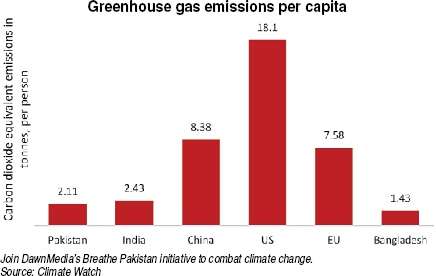Introduction
The global climate crisis has laid bare the stark double standards that exist between the Global North and the Global South. An average American emits over eight times more greenhouse gases (GHG) than a Pakistani, yet it is Pakistan that finds itself among the countries most vulnerable to the impacts of climate change. This disparity raises significant ethical and practical questions about responsibility, accountability, and the path forward in addressing the global climate emergency.
Historical Context of Emissions
Industrialization and Emissions
The industrial revolution, which began in the late 18th century, marked the start of significant GHG emissions. The United States and European Union have been at the forefront of this industrial boom, leading to substantial economic growth and development. However, this progress came at a high environmental cost. According to the World Resource Institute, the US and EU have contributed 37% of the world’s cumulative GHG emissions.
The Link Between Wealth and Emissions
Historically, there has been a direct correlation between wealth, industrialization, and emissions. As countries industrialize, their consumption patterns and energy needs increase, leading to higher emissions. This trend is evident in developed nations, where high-income levels are associated with energy-intensive lifestyles and significant carbon footprints.
Current Emission Trends
The Energy Crisis in Developing Nations
Despite their lower historical emissions, developing nations like Pakistan are facing severe consequences of climate change. The challenge of developing indigenous coal sources is compounded by the high costs of climate adaptation and mitigation. The smog cloud over South Asia, visible from space, is a stark reminder of the region’s environmental challenges.
Renewable Energy Adoption
Globally, there has been a shift towards renewable energy. The International Energy Agency reports that 90% of new electricity generation in 2022 came from renewable sources. Despite this progress, the countries most capable of affording renewable energy solutions remain among the highest emitters of GHG. The 2024 Global Carbon Budget projects a slight increase in fossil carbon dioxide emissions, highlighting the slow pace of transition in the highest emitting nations.
The Ethical Imperative for Action
The Need for Accelerated Emission Reductions
Developed nations have a moral and ethical responsibility to lead the charge in reducing emissions. Their historical contribution to the climate crisis necessitates urgent action to mitigate further damage. This includes adopting more aggressive policies to cut emissions and transitioning to renewable energy sources.
Supporting Vulnerable Nations
In addition to reducing their own emissions, developed nations must support vulnerable countries like Pakistan in their climate adaptation and mitigation efforts. This support should come in the form of financial aid, technology transfer, and capacity building. Climate equity demands that those who have contributed the most to the problem also contribute the most to the solution.
Pathways to Climate Equity
Financial Support
One of the most critical forms of support is financial assistance. Developing nations need funds to build resilient infrastructure, invest in renewable energy, and implement effective climate adaptation strategies. The Global North, with its greater financial resources, must step up to provide this support.
Technological Transfer
Technology transfer is another crucial area. Advanced technologies for renewable energy, waste management, and carbon capture and storage are essential for developing nations to transition to low-carbon economies. Developed countries should facilitate access to these technologies through partnerships and collaborations.
Capacity Building
Building local capacity is vital for sustainable development. This involves training local communities, enhancing institutional frameworks, and developing robust policies for climate action. Capacity building ensures that developing nations can independently manage and sustain their climate initiatives in the long term.
Conclusion
The climate double standards between the Global North and the Global South are clear and undeniable. While developed nations have historically contributed the most to GHG emissions, developing countries like Pakistan bear the brunt of climate impacts. The time for action is now. Developed nations must not only accelerate their own emissions reductions but also provide substantial support to vulnerable countries. Achieving climate equity is not just a moral imperative; it is essential for the survival and prosperity of our global community.
FAQs
1. Why do developed countries have higher emissions than developing countries?
Developed countries have higher emissions due to their industrialization and energy-intensive lifestyles. Historically, economic growth in these nations has been powered by fossil fuels, leading to significant GHG emissions.
2. What is the Global Carbon Budget?
The Global Carbon Budget is an annual report that provides an estimate of global carbon dioxide emissions and their distribution among countries and sectors. It highlights trends and projections for future emissions.
3. How can developed countries support developing nations in climate action?
Developed countries can support developing nations through financial assistance, technology transfer, and capacity building. This support helps vulnerable countries adapt to climate change and transition to low-carbon economies.
4. What role does renewable energy play in reducing emissions?
Renewable energy is crucial for reducing emissions as it provides a clean alternative to fossil fuels. Increasing the share of renewables in the energy mix helps lower overall GHG emissions and mitigates climate change.
5. What is climate equity?
Climate equity refers to the fair distribution of the benefits and burdens of climate action. It involves ensuring that those who have historically contributed the most to climate change also take the lead in addressing it and supporting those who are most affected.
ALSO READ:



